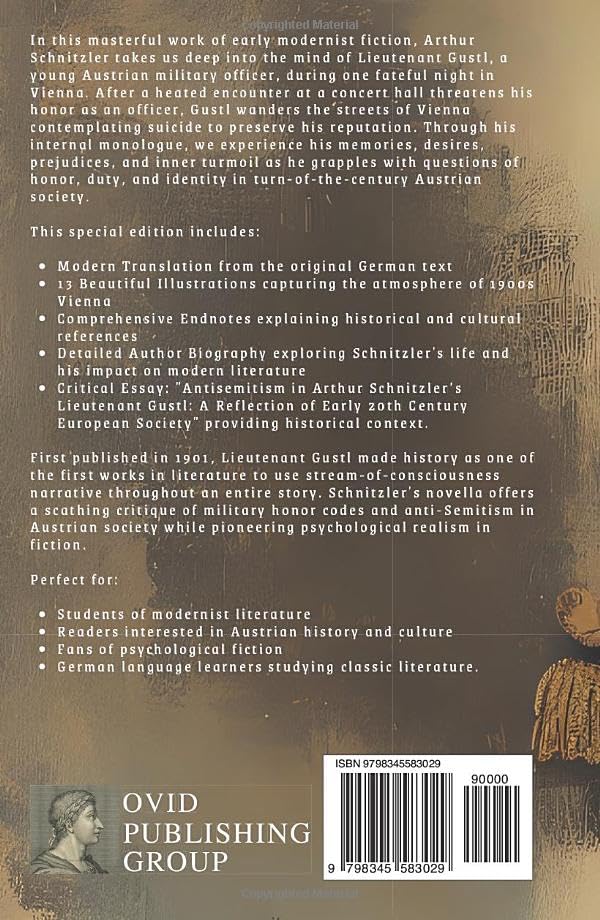A groundbreaking psychological novella that revolutionized stream-of-consciousness storytelling In this masterful work of early modernist fiction, Arthur Schnitzler takes us deep into the mind of Lieutenant Gustl, a young Austrian military officer, during one fateful night in Vienna. After a heated encounter at a concert hall threatens his honor as an officer, Gustl wanders the streets of Vienna contemplating suicide to preserve his reputation. Through his internal monologue, we experience his memories, desires, prejudices, and inner turmoil as he grapples with questions of honor, duty, and identity in turn-of-the-century Austrian society. This special edition includes: Modern Translation from the original German text - 13 Beautiful Illustrations capturing the atmosphere of 1900s Vienna - Comprehensive Endnotes explaining historical and cultural references - Detailed Author Biography exploring Schnitzler's life and his impact on modern literature - Critical Essay : "Antisemitism in Arthur Schnitzler’s Lieutenant Gustl : A Reflection of Early 20th Century European Society" providing historical context First published in 1901, Lieutenant Gustl made history as one of the first works in literature to use stream-of-consciousness narrative throughout an entire story. Schnitzler's novella offers a scathing critique of military honor codes and anti-Semitism in Austrian society while pioneering psychological realism in fiction. Perfect for: Students of modernist literature - Readers interested in Austrian history and culture - Fans of psychological fiction - German language learners studying classic literature Experience this landmark work of modernist fiction in a definitive edition that brings turn-of-the-century Vienna vividly to life. Arthur Schnitzler (15 May 1862 – 21 October 1931) was an Austrian author and dramatist. He is considered one of the most significant representatives of the Viennese Modernism. Schnitzler’s works, which include psychological dramas and narratives, looked beneath the surface of turn-of-the-century Viennese bourgeois life, making him a sharp and stylistically conscious chronicler of Viennese society around 1900. In 1885, Schnitzler earned a medical doctorate from the University of Vienna. He eventually left the field of medicine to pursue writing. Schnitzler was a contemporary of Sigmund Freud, who often exchanged letters during their lives. In one such letter, Sigmund Freud admitted, "I have gained the impression that you have learned through intuition – although actually as a result of sensitive introspection – everything that I have had to unearth by laborious work on other persons." Schnitzler's writings frequently sparked controversy, both for their candid depictions of sexuality and their staunch opposition to antisemitism, as exemplified by works such as his play Professor Bernhardi and his novel Der Weg ins Freie . However, despite Schnitzler's Jewish heritage, Professor Bernhardi and Fräulein Else are among the few of his protagonists who are clearly identified as Jewish. Several of his books have been adapted into movies, including La Ronde , Fräulein Else, and Traumnovelle ( Dream Story ) was adapted by Stanley Kubrick in 1999 into the film Eyes Wide Shut, starring Tom Cruise and Nicole Kidman.















